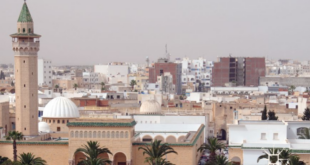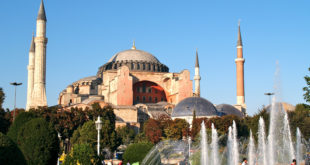Mohammad Hammam, Executive Manager of Iqra Satellite Channel, Talks to TBS
As one of the fastest growing religions in the world, Islam has become both a media focus and a media victim in recent years.
According to 30-year-old Muhammad Hammam, executive manager of Iqra, the Arab world's longest-established Islamic satellite channel, a considerable part of the Western media has managed to "attach a negative sense to such a fact -- or rather hypothesis -- unjustly and even dangerously, mistreating and misrepresenting Islam and Muslims."
Launched 1996 as part of the ART media organization owned by Saudi Sheikh Saleh Kamel, Iqra attempts to counteract such misrepresentations of Islam by "striving to project the real image of true, tolerant Islam," Hammam says. The channel also endeavors "to eliminate misunderstandings common not only among non-Muslims, but ironically among Muslims themselves, in addition to safeguarding Islamic cultural values and forms," he adds.
In an age when globalization is supposedly drawing humanity together, Iqra attempts to answer the charge that Islam abets the clash of civilizations.
"Terrorism has become synonymous with Islam," Hammam says, "and such misinterpretation is supported by some Western media networks." He maintains the belief that "the gap separating Islam and the West must be bridged, and that the media have a moral obligation to attempt to provide that much-needed bridge, avoiding generalizations and stereotypes, which is not the actual state of things."
But if the media are part of the problem, it may also be part of the solution. If an inattentive, shallow, or ill-intentioned media can accelerate a clash of civilizations, then a more perceptive, profound, and objective media can reverse the action. Instead of distorting or discrediting old cultures, media can be used to re-validate them, and help explain and represent them to the world, Hammam believes.
"Iqra, conveniently, chose to edge away gradually from tackling strictly doctrinal issues, setting out to deal more with worldly and contemporary issues and providing people with a lifestyle rather than mere preaching and orders telling them what to do and what to avoid," he says.
"In addition to the theological experts from established religious institutions such as Al-Azhar, Iqra now frequently hosts specialists and religious scholars from all parts of the globe," he explains. "Hand in hand with the usual programs on the Qur'an and Hadith, Iqra features talk-shows and interviews on religious, social, and cultural issues, with live audience participation. For in the Islamic tradition there is no sharp division between the spiritual and the material worlds. For Muslims, the concepts of din (religion) and dunya (the world) are interwoven."
Hammam also is well aware of the double challenge posed to Iqra by the abundance of entertainment satellite channels, well-backed by extensive resources and funded by commercials and advertisements. However, he remains confident of Iqra's ability to attract audiences and advertisers.
"Entertainment satellite channels, like MBC, LBC, and others are hard to compete with, mainly because of the lack of funding, an area where such channels excel," he says. "Because Iqra is a channel with a declared Islamic approach, most advertisers avoid it. We know for example that multinational companies and organizations have a policy of avoiding getting into politics and religion. However, with programs like (popular Islamic preacher) Amr Khaled's and the like, and as we introduce the balanced, moderate face of Islam without compromising any of its basic doctrines, we are starting to attract both more commercials and more viewership. Competition may be countered by concentrating on the quality rather than quantity of programs, as well as developing the techniques and the 'look' of our channel -- hence, the hosting of once glamorous and now retired actresses who have given up their professions, as well as introducing interactive programs that make the audience more involved.
"Of course it is a long process and it takes time. Islamic media is still in its infancy and five to seven years are not enough to change long-lasting attitudes. But we have got started and we are moving slowly but surely, so as to avoid falling victims to intimidation or compromise. We are not trying to defend Islam. Islam does not need anyone to defend it, for God has vowed to preserve it. What we aim at is to well represent it in the way it really is."
In an age of globalization and rapid communications, Iqra faces a challenge in stressing the cultural particularism of Islamic civilization, Hammam says.
"The idea that the globe is getting smaller due to revolution in communications is a commonplace one," he says. "Yet that idea has recently taken a new turn, not merely geographic in essence, especially with cultures expanding against one another and sometimes creating struggles. New methods in the world of communication and media can draw cultures nearer now so that they interrelate with growing familiarity. Not only can people travel around the globe in a few hours, but they can also transmit words, values, and aspects of their culture. Yet even as globalization moves to encompass the world so powerfully, another profound and forceful counter-trend keeps growing all over the world: a revival of cultural particularism, with mounting stress on ethnic and religious identity.
"Such a 'tribal' attitude represents an impulsive desire to take shelter in the face of the sweeping threats of globalization; hence the tendency to protect the 'traditional' as a means of counter-balancing the overwhelming 'universal,'" says Hammam. "The cultural environment of Muslims -- and we are talking about over one billion, almost one quarter of the world's population -- is not really understood in other parts of the world. This is partly so because of the superficial and misleading way that world media has dealt with Islam and Muslim tradition. Therefore, we have a double mission here: to correct the superficial and misrepresented image of Islam for world audiences, as well as to mend Muslims' own misunderstanding of their religion."
Is media then expected to become a tool for "educating" people, instead of offering information to people and letting them shape their own minds?
"Media is in part a tool to 'direct' and enlighten people," Hammam asserts. "But ultimately, audiences grow out of control, at least partly. However, I believe that even the most supposedly objective media -- the US media, that is -- is used as a tool to shape people's minds and public opinion. So there is nothing wrong with 'directing' people, especially when our message is the sublime values of Islam."
Working out of four production centers in Saudi Arabia, Egypt, Dubai, and Lebanon, Iqra sees itself as combating the far-reaching effects of September 11, says Hammam.
"Before 9-11, Arab media were only talking among themselves," he explains. "Now we realize it is important to start addressing the world. That is why we plan to launch an English-speaking channel."
While waiting for the necessary funding, Iqra has produced several English programs and talk-shows. The channel is also expanding its offerings to include dramas and comedies.
"On the other hand, we realize that it is quite hard to compete with entertainment channels, because they address the senses, while we address the mind, but still by working on developing the quality of our programs we have achieved a large part of our aims and dreams," states Hammam. "Last Ramadan we came second only to MBC in Arab world viewership. And we know development is a never-ending process. Last year we introduced our first drama show. It was a comedy produced to entertain but without compromising the principles of Islam, and it proved a success. We have the Iranian experiment in film-making to draw on, for example, and it is a very rich and successful model. And, of course, there is Amr Khaled, our great asset, whose simple, candid, casual, and cordial preaching has never failed to attract more audiences over the years."
 Arab Media & Society The Arab Media Hub
Arab Media & Society The Arab Media Hub




